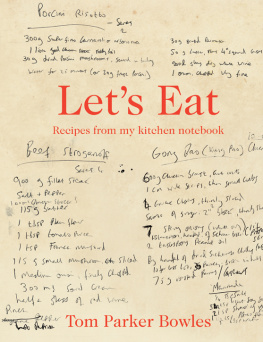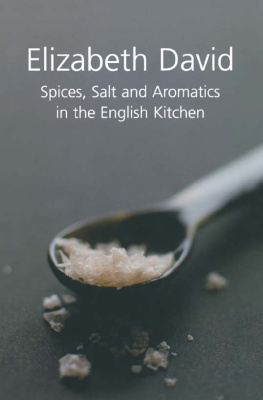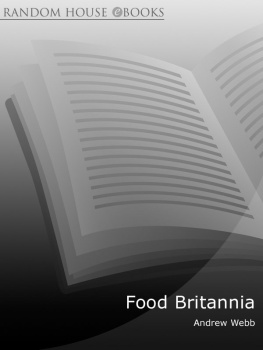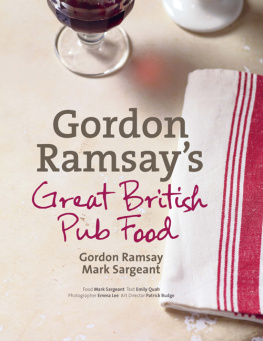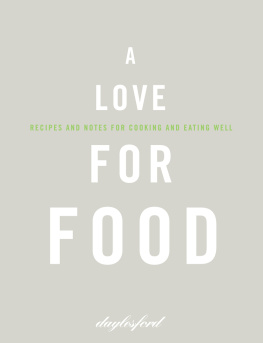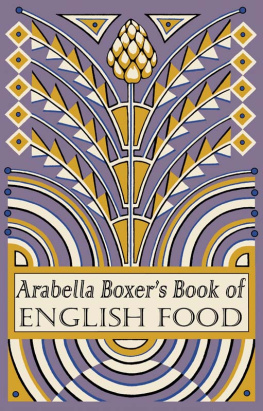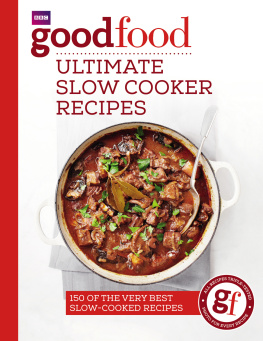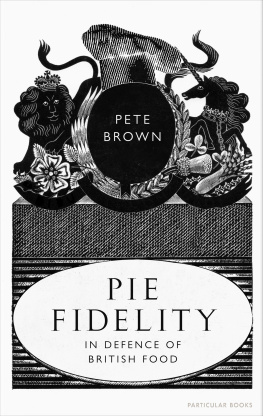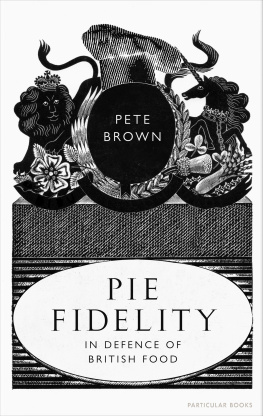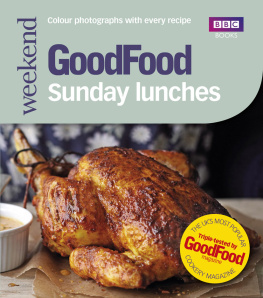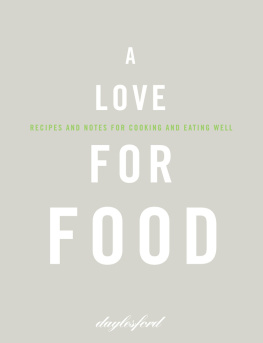Contents
List of Recipes
THE WEST
THE NORTH
THE MIDLANDS
THE EAST
LONDON
FULL ENGLISH
About the Book
Tom Parker Bowles takes a picaresque journey across the country to learn about the English through our love-affair with food
From the West Country cider brewers to Yorkshire tripe dressers, Tom meets the punters and producers at the heart of our food traditions and samples the very best of real English food: Bury black pudding, home-cured Wiltshire Bacon and the planets finest cheddar.
But Full English is no paean to an imagined land where yokels sip ale together while chomping on pork pies. Toms quest delves beneath the surface to unearth the real story behind our eating habits, and what the food of today says about us: organic heaven or mass-produced hell?
Peppered with mouth-watering recipes and recommendations, Toms pilgrimage maps out Englands defining dishes: fish & chips in the north, balti in the midlands, snail porridge at the Fat Duck. But it is the colourful characters we meet along the way who truly bring Full English to life.
About the Author
Tom Parker Bowles is a food writer with a weekly column in the Mail on Sundays Live magazine. He is also a contributing editor to GQ. He co-hosts The Market Kitchen on UK TV and is a regular contributor on Gordon Ramsays The F Word. He is the author of E is for Eating: An Alphabet of Greed and The Year of Eating Dangerously.
Also by Tom Parker Bowles
E is for Eating
The Year of Eating Dangerously
To Lola
Prologue
The French, they say, live to eat. The English, on the other hand, eat to die.
Martin Amis, Money (1984)
In the eighteenth century English inns were so renowned for their good cheer as to have caused contemporary French travellers to lament that in no French province could their equals be found.
P. Morton Shand, A Book of Food (1927)
AS PIES GO , this one sat somewhere between glum and downright suicidal. The crust was mean and purse lipped, and despite a good half-hour spent sweating in the oven it stubbornly refused to brown. Little wonder, being constructed from a dreary mlange of potatoes, margarine and baking powder. The filling, though, was more depressing still a pound each of diced potatoes, carrots, swedes and cauliflower, boiled mercilessly until each soggy lump had oozed into one homogenous mess. Then baked, just to ensure that any last traces of texture were utterly obliterated. A few pinches of salt fought valiantly for life but stood little chance against this relentless vegetative assault. As for the spring onions, they disappeared into the sludge, never to be heard from again.
The name of this wretched concoction was Lord Woolton pie, named after the eponymous Minister of Food when it was introduced in May 1941. Two years into the Second World War, Woolton was a largely popular figure, cajoling the public into munching on meatless rissoles, mock hare soup and all manner of ersatz creations. The pie, although cheap and easy on the ration book, was hardly a high point of British cooking. And it trudged across the palate, watery and morose, little more than a primeval soup of root vegetables. The pastry added nothing, save a coating of cheap fat, slathered across the roof of ones mouth joyless fodder for difficult times. My friend Bill, with whom I was cooking the damned thing, agreed. He took a bite, wrinkled his nose and set down his fork. Im starting to feel the wartime drudgery already.
The mock goose was marginally better, but only in the way that death by lethal injection is preferable to the electric chair. A few ounces of split red lentils are cooked to a mush, then seasoned with a touch of lemon juice (a modern embellishment), salt and pepper. A large onion is then sauted in water (those wartime recipe books were certainly inventive with their euphemisms), mixed with sage and breadcrumbs, stuffed between two cake-shaped portions of the lentils, and baked until dry and turgid. What it has to do with goose, I dont know, although its certainly a fascinating study in different shades of beige. I suppose that the sage, onion and breadcrumbs are meant to ape a traditional stuffing, but without the pork (which was fiercely rationed), it sort of loses the will to live.
We had meant to move on to donkey (or mealie) pudding, where all sorts of indecent things are done to leeks and oatmeal, and mock fish cakes, where bloater paste took the place of fresh fish. Or even mock clotted cream, a sorry coming together of margarine, sugar, dried milk powder and vanilla essence. Instead we had given up, sunk into an all-too-real gloom cast by these ersatz recipes. The experiment over, we binned the wretched results and wandered off down to the pub, for sausages, beer and salt-beef sandwiches.
The afternoon of cooking had started as a very loose sort of experiment. I was researching an article about rationing in Britain. I could just about remember those posters from school, Dig for Victory and Food is a Munition of War, but they were little more than colourful splashes on the classroom wall, something to gaze at while some poor teacher grappled with the intricacies of the Schleswig Holstein Question. My favourite of all was Better Pot-Luck with Churchill today than humble pie under Hitler tomorrow. Dont waste food. Leaving aside the Hun bashing, the advice now seems as pertinent as ever. In these financially challenged times, the papers are filled with eulogies to the cheaper cuts of meat, and parsimony, they say, is back in vogue. We do tend to assume, though, that in the past, every woman up and down the land was blessed with exquisite cooking skills, and a culinary knowledge to match.
It is obvious, even before the Second World War, that this was a little wide of the mark. A butcher with a sense of humour, whose shop was in a wealthy district, once said to me, wrote Florence White in 1923, They all want cutlets or chops; an animal aint made up only of chops, but they cant cook anything else. I wish theyd learn to cook the cheaper cuts. A woman greengrocer in a poor district said to me: Its pitiful to think young married women mere girls! cant cook. They come to me and ask me to tell them. They dont even know how to cook a potato, and we cant sell them some vegetables because they dont know how to cook them. This was like the scent of truffle to a snuffling pig, spurring me deeper still. Everything I had previously believed of English food, of its pre-war glories and pies for all, was suddenly challenged. My assumptions were shallow, my understanding strictly limited.
We emerged from those bleak war years with an understandable acceptance of the bland and uninspiring, and a reliance on foods of convenience, tinned, frozen or freeze dried. Good food was seen as a luxury and to abandon oneself to the pursuit of gastronomic pleasure was not the done thing. Rationing lasted for approximately fifteen years, writes Philippa Pullar in Consuming Passions. It had the effect of changing the British diet in a major way. It reduced the overall standard to a uniform level. Everyone, whether rich or poor, whether in town or country, was eating the same food.
Many Victorians saw a love of food as synonymous with weak morals, natural indolence and suspect, continental ways. Victorian children were steeped in original sin, according to Pullar, and were therefore never indulged or allowed to show pleasure in eating, in case it led to improper passion. Tablecloths, its said, were there to cover exposed table legs, lest those wooden protuberances excite an ungodly stirring of the loins. Sensual enjoyment was seen as shameful in public (while in private, pornography reached a quivering crescendo of lascivious popularity). The Puritans, in the mid-seventeenth century, were worse still, even going as far as to ban the Christmas feast. There was no such thing as pure gustatory pleasure. To feast meant gluttony and gluttony, dear child, was a deadly sin.
Next page

